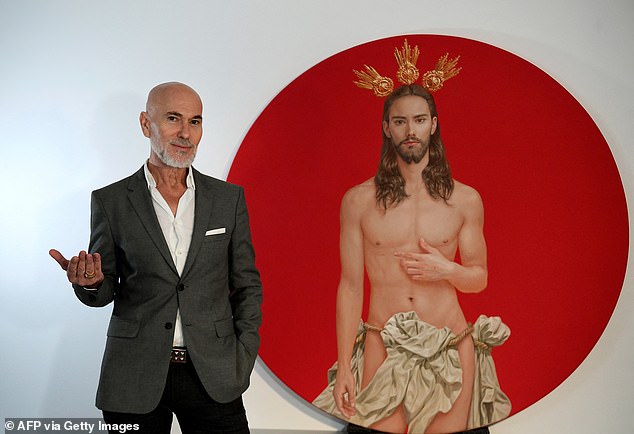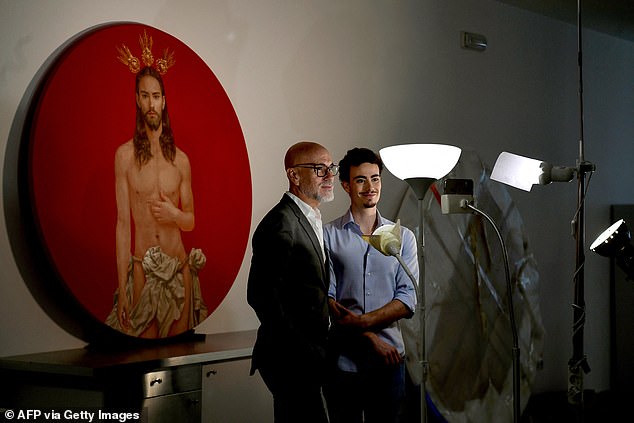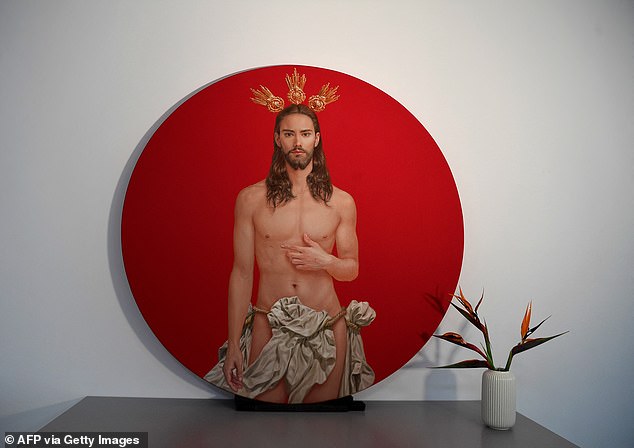He’s not the Messiah, he’s a VERY naughty boy: Spanish right-wing fury over ‘sexualised’ and ‘homoerotic’ Jesus poster as Christ poses semi-naked and part draped in cloth
- Salustiano Garcia’s depiction of Jesus excited and bothered many in Spain
- He based the painting of the holy figure on his son
- Critics have said the painting is ‘sexual’ and ‘homoerotic’
A poster featuring Christ to promote Easter week in Seville has provoked a sharp reaction from Spanish ultra-conservatives, who branded the poster as ‘sexualised’ and ‘homoerotic’.
The poster, designed by Sevillian artist Salustiano Garcia, shows Christ after his resurrection from the dead, half-naked in front of a blood-red background, with the lower part of his body covered by a white cloth.
It shows “the bright side of Holy Week” in the “purest style of this prestigious painter”, according to the Council of Fraternities and Guilds, which organizes the main Easter Week events in the southern city.
However, in a response on social media, many people labeled the poster as “sexualized.”
“It is absolutely shameful and an aberration,” wrote the ultra-conservative Catholic IPSE, which says it promotes “respect for Christian symbols” and actively opposes abortion.
The poster, designed by Sevillian artist Salustiano Garcia (pictured, left), shows Christ after his resurrection from the dead, half-naked in front of a blood-red background

Commenting on social media, many people labeled the poster as ‘sexualized’

The artist told right-wing newspaper ABC that his depiction of Christ, based on an image of his son, was “gentle, elegant and beautiful.”

Spain decriminalized homosexuality in 1978, three years after Franco’s dictatorship ended
The image portrayed Christ as ‘effeminate’ and ‘camp’, and demanded a public apology from the artist for a poster that was not in the spirit of Holy Week.
Javier Navarro of the far-right Vox party joined the chorus of disapproval, saying the poster “sought to provoke” and did not put forward the aim of “encouraging the faithful to participate in Holy Week in Seville” in comments on X, formerly Twitter.
The artist told right-wing newspaper ABC that his depiction of Christ, based on an image of his son, was “gentle, elegant and beautiful” and made with “deep respect.”
“To see sexuality in my image of Christ you would have to be crazy,” he said, emphasizing that there was “nothing” in his painting that “has not already been depicted in works of art hundreds of years old.”
Juan Espadas, leader of Spain’s ruling Socialist party in the southern region of Andalusia, immediately came to the defense of the artwork, denouncing the “expressions of homophobia and hatred” it had stirred up and saying it undermined the region’s “tradition and modernity” combined.
Holy Week celebrations, which commemorate the death and resurrection of Christ, are very important in deeply Catholic Spain, especially in Seville, which is widely seen as the center of such festivities.
Spain decriminalized homosexuality in 1978, three years after Franco’s dictatorship ended, and is one of the most open countries in the world when it comes to LGBTQ rights. It has allowed gay marriages and adopted gay couples since 2005.
